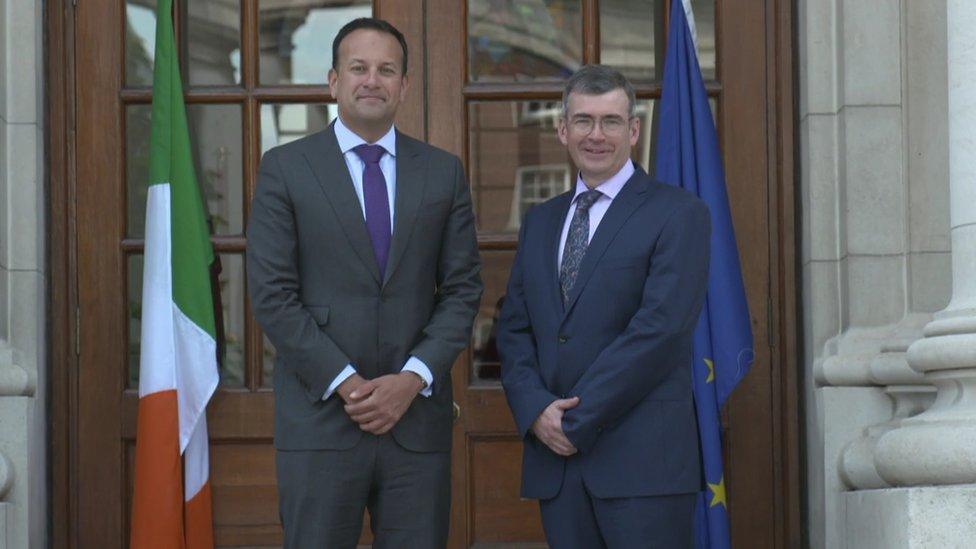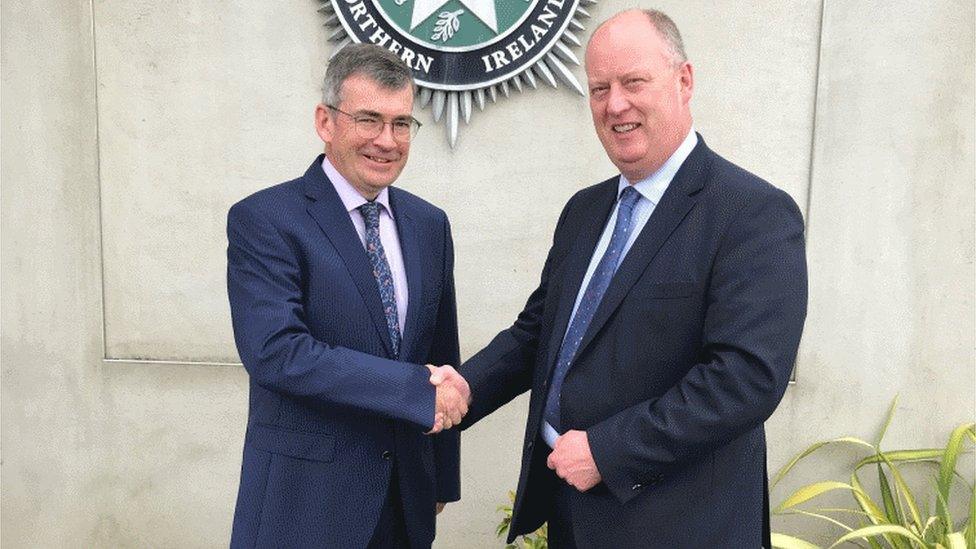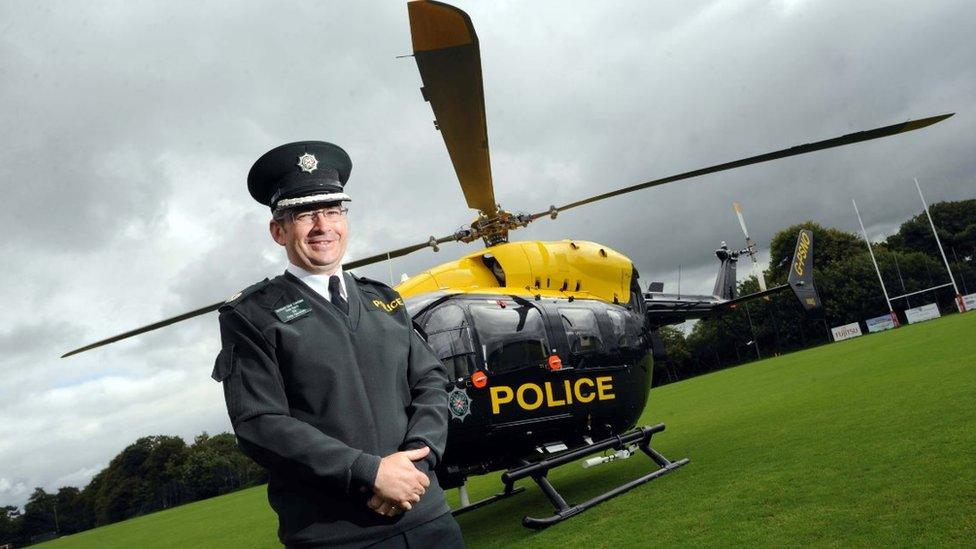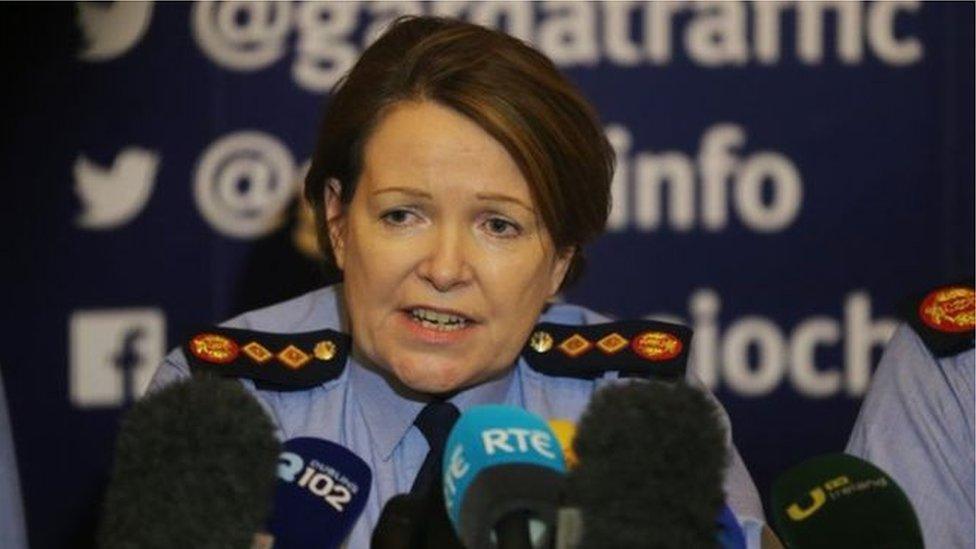PSNI's Drew Harris appointed Garda commissioner
- Published
Taoiseach has confidence in new police chief
PSNI Deputy Chief Constable Drew Harris has been appointed as the new head of the police in the Republic of Ireland.
The appointment is for a five-year term and Mr Harris, who will receive an annual salary of €250,000 (£200,300), will take up the post in September.
Taoiseach Leo Varadkar said Mr Harris' appointment allows the State to "take a new direction in Irish policing".
It is the first time the job has been given to an external candidate.

Drew Harris and Taoiseach Leo Varadkar at government buildings in Dublin
He replaces Nóirín O'Sullivan who retired last September.
Mr Harris has been a police officer for 34 years. His father, a senior member of the Royal Ulster Constabulary, was murdered in an IRA bomb attack in 1989.
Mr Varadkar said Mr Harris was the best candidate for the job and that the government was "confident he will fulfil his duties with absolute dedication and loyalty".
Minister for Justice Charlie Flanagan said he was looking forward to working with Mr Harris "on our shared objective of ensuring the security of the State and the safety of the public".
He will take up his post on the retirement of Acting Commissioner Dónall Ó Cualáin.

Impressive CV
Analysis by Vincent Kearney, BBC News NI Home Affairs correspondent
The appointment of Drew Harris will have caused surprise, and perhaps even concern, in some quarters.
No one can question his policing credentials.
The CV he attached to his application form for this job spanned 35 years experience of policing. It's the nature of some of that experience that may draw criticism.
Before being appointed deputy chief constable of the PSNI in October 2014, Drew Harris led the department responsible for tackling dissident republican activity.
Read more here.


PSNI Chief Constable George Hamilton said the PSNI would be a "poorer place" without his deputy
PSNI Chief Constable George Hamilton said Mr Harris was "a man of unfathomable strength, humility and grace".
"This appointment can only serve to build on what is already a close working relationship between the PSNI and An Garda Síochána," he said.
"The mutual desire of both organisations to keep people safe will support us in overcoming the many challenges we jointly face, including Brexit."


Who is Drew Harris?
Drew Harris has been a police officer for 35 years. He started his career in 1983 in the Royal Ulster Constabulary (RUC) - the Police Service of Northern Ireland (PSNI) replaced the RUC in 2001.
His father Supt Alwyn Harris was also an RUC officer who was murdered in 1989 when the IRA planted a bomb under his car.
Drew Harris, who is married with four grown-up children, has held a number of senior roles with the PSNI.
For the past four years, he has been second in command, serving as deputy to Chief Constable George Hamilton.
Mr Harris, who was awarded an OBE in 2010, is an expert in high-risk covert policing operations and critical incidents.
He has a degree in politics and economics, and a masters in criminology.
Earlier this year, both Mr Harris and Mr Hamilton were cleared of allegations of criminal activity and misconduct in public office.
It followed an investigation by the police ombudsman into complaints over a PSNI bribery inquiry.

'Absolute dedication and loyalty'
On taking up the post, Mr Harris will make a solemn declaration under the Garda Síochána Act 2005 to uphold the Constitution and the laws of the Republic of Ireland.
Mr Harris was shortlisted with five other candidates for the top Garda (Irish police) role - it followed a new international selection process designed to attract the widest possible field of candidates.

Garda Commissioner Nóirín O'Sullivan retired in September 2017 after facing intense criticism over issues including the treatment of police whistleblowers
An Garda Síochána has faced severe criticisms for its handling of a number of scandals.
Commissioner O'Sullivan retired after she faced intense criticism over a number of issues, including the treatment of police whistleblowers which is now the subject of a tribunal.
In March 2017 it emerged that the Gardaí faked almost one million drink-driving tests.
Data recorded on the Garda computer system - known as Pulse - was compared against data recorded by the Medical Bureau of Road Safety and a "significant deficit" was identified.
Officers said the Pulse system recorded 1,995,369 breath tests, while the Medical Bureau of Road Safety Data recorded only 1,058,157 tests during the same period.